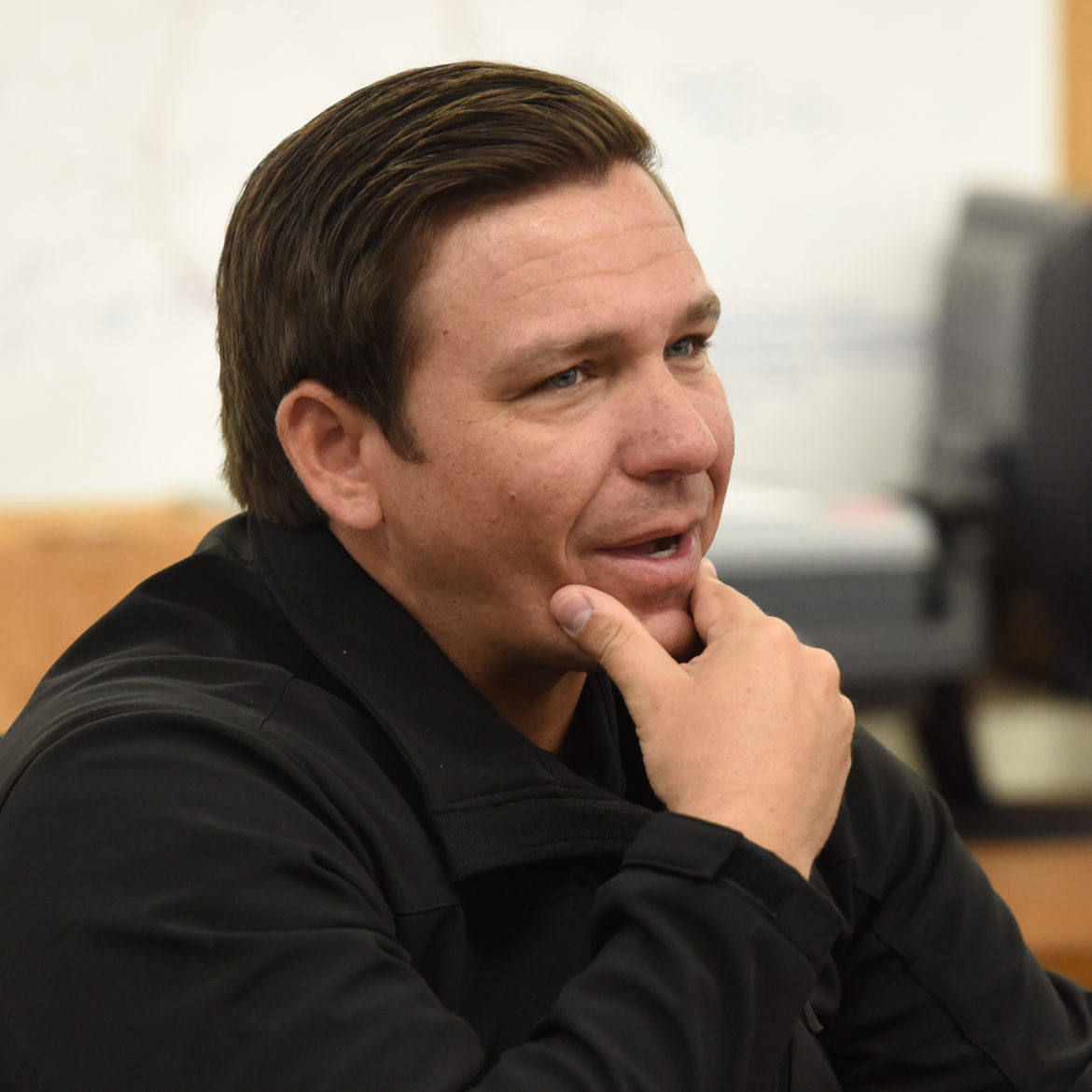MIAMI — In the first week for new Florida Gov. Ron DeSantis, there’s been one prevailing sentiment: surprise.
As a congressman from North Florida, DeSantis was relatively unknown statewide until, as part of his campaign for governor, he unleashed a jaw-droppingly pro-Trump video in which he read “Trump: The Art of the Deal” to his baby and built a wall out of toy bricks with his toddler. On the campaign trail, he stood behind police and supported mandatory minimums.
Following that, many Floridians expected the same hard-right, pro-business-at-all-costs style of governing that had been established by DeSantis’ predecessor, Rick Scott. Instead, DeSantis’ Week One included moves that even avowed leftists could get behind, like committing $2.5 billion to environmental cleanup and nominating a Cuban-American woman to the state supreme court. He and his cabinet posthumously pardoned the Groveland Four, a group of African-Americans who were falsely accused of raping a white woman in 1949.
What does that portend for criminal justice?
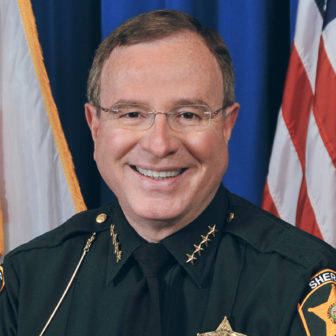
Polk County Sheriff's Office
Grady Judd
“The jury’s still out,” said Grady Judd, the sheriff of Polk County, southwest of Orlando.
Some contentious issues in Florida include mandatory minimum sentences, a requirement that prisoners serve 85 percent of their sentences and the use of direct file, wherein prosecutors decide to charge juveniles in adult courts. School shootings are particularly worrisome following the 2018 massacre at Marjory Stoneman Douglas High School in Parkland, and the state is in the process of rolling out a medical marijuana system.
DeSantis’ appointees to lead the Department of Juvenile Justice and the Department of Corrections represent an interesting cross-section of both conservatives and reformists.
Simone Marstiller
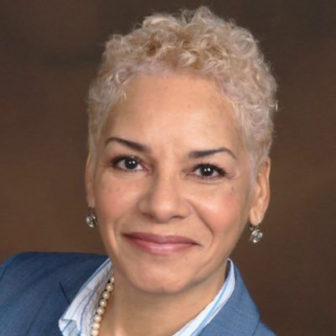
Simone Marstiller
Simone Marstiller rose to prominence in 2003, when she was tapped by then-Gov. Jeb Bush to serve as his deputy chief of staff. She had roles leading the state, the Department of Business and Professional Regulation and the Florida Elections Commission, and was a judge on the First District Court of Appeal in Tallahassee for six years. She left the bench and was in private practice (and had been appointed to serve through 2020 on the Judicial Management Council that advises the state Supreme Court) when DeSantis chose her to lead the Department of Juvenile Justice.
Marstiller (who declined an interview request) describes herself on Twitter as “conservative, Christian.” In a January 2018 op-ed that ran in the Miami Herald, she called for a “paradigm shift” in criminal justice — a focus on rehabilitation instead of incarceration. She wrote that as a judge, she’d seen countless first-time offenders who had been convicted of low-level drug crimes and received unreasonably long prison sentences. She called for a “judicial safety valve” that would let judges use discretion to depart from mandatory minimums in sentencing.
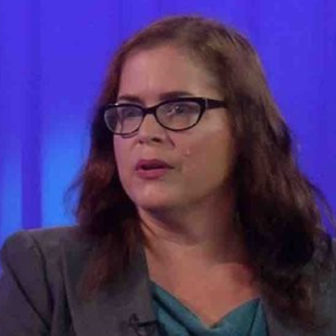
Deborrah Brodsky
Deborrah Brodsky, director of the Project on Accountable Justice (PAJ), a think tank at Florida State University, said Marstiller was just about to become chair of PAJ’s executive committee when she got the DJJ job.
Brodsky said that in Marstiller, DeSantis “has picked a person who is very analytical, rational and has incredible management skills. He’s picked her because she is a leader … a strong leader who’s able to get a good read on [what needs to be done.]” Brodsky remembers a time when Marstiller had dissuaded her from pursuing some “zany” idea. “She’s a truth teller. A straight shooter. The kind of friend who will tell you, ‘You know what, emperor? You aren’t wearing any clothes.’”
Other colleagues echoed the praise. Lila Jaber, regional managing shareholder of the Gunster law firm, where Marstiller most recently worked, said, “Simone makes everything she touches better and more efficient. Her talent will be missed at Gunster but with public service in her heart, Simone will make all of her Gunster colleagues proud.”
Jeb Bush tweeted that Marstiller was “Another fantastic appointment by Governor-elect @RonDeSantisFL! Simone will bring strong leadership to @fladjj and will continue her record of serving our state with integrity.”
Mark Inch
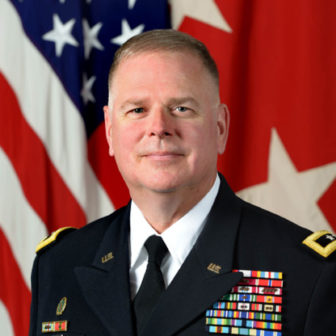
Mark Inch
Then there’s DeSantis’ pick to run Florida’s Department of Corrections: Mark Inch, a retired U.S. Army major general who studied biblical archaeology at Wheaton College and went on to command troops in Afghanistan. President Donald Trump tapped him to run the Federal Bureau of Prisons, but Inch resigned abruptly in May after eight months on the job. (Reports suggested friction with Trump’s son-in-law Jared Kushner and then-Attorney General Jeff Sessions.)
Inch (who was not available to comment) advocated for a balance between punishment and restoration while supporting the federal First Step Act, which lets judges depart from mandatory minimums and other reforms, in a December op-ed on the conservative site the Daily Caller.
“Retribution and incapacitation is just, and rehabilitation and restoration is an expression of mercy,” Inch wrote. “I call on those who focus on the first, at the exclusion of the second, to search your heart for mercy. I call on those that focus on the second, to remember the cost of crime to society and victims, and temper your advocacy in light of these facts.”
To longtime state Sen. Jeff Brandes, a Republican from St. Petersburg who chairs the criminal justice appropriations committee, the hiring of Inch signaled that Florida might finally make strides improving its corrections department. For years, problems have plagued the system: inmate deaths, abusive guards, low pay and the constant struggle for funding.
"He's somebody who has spent his life trying to make these types of systems better," Brandes told the Jacksonville Times-Union. "I don't think he was brought in to maintain the status quo.”
What others want DeSantis to do
R.J. Larizza, state attorney for Florida’s 7th Judicial Circuit and head of the Florida Prosecuting Attorneys Association, said some of the things the new administration should prioritize are logistical — like securing funding and figuring out how to function in a digital age.
“There are 20 circuits — they can all have different software,” he said. “All of these different agencies have to be able to communicate, to share and pull all that data” — a task made challenging by new technology, especially body cams. Some laws were well-intentioned — like the federal rule restricting release of medical information, laws requiring redactions in public records and a new Florida data transparency law — but make compliance complicated.
“What good is a data transparency bill if the information isn’t accurate? It could be very dangerous if data is pulled and it’s inaccurate or incomplete,” Larizza said.
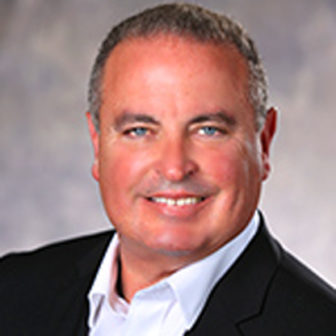
The Children's Trust
Gus Barreiro
Gus Barreiro, a Republican former state legislator and current public policy and community engagement liaison for The Children’s Trust, suggests the administration’s first priority should be making sure they have good personnel in key positions.
“I think most secretaries come in with the great idea of making changes,” he said, “... but two layers down are people who have been here 30 years. The Be Here club. They say, ‘I’ve been here before this administration, I’ll be here during this administration, and I’ll be here after this administration.’”
Committee recommendations to come
Between Election Day in November and Inauguration Day in January, DeSantis invited 45 people with expertise in criminal justice to join a group called the Transition Advisory Committee on Public Safety, which has been brainstorming and will issue recommendations.
Polk County Sheriff Judd sits on that committee. He said both reformists and hard-liners in the group were close to agreement on certain reforms, such as increasing the threshold for felony grand theft (currently $300 or more) or adjusting the instances where mandatory direct file would apply.
“We definitely agree as a group that there should be some reform as far as prisoner reentry, preparing inmates better for work and reentry into society,” Judd said. “Specialty courts are another one — mental health courts, drug courts, veterans courts — those could expand and increase.” But funding must be found, he said. “You need more judges, more prosecutors, staff to be there physically in those courts.”
A “safety valve” that would give judges some ability to depart from minimum mandatories is being debated, Judd said. But he reminded his peers that, despite current sentiment leaning toward reform, the state had gotten tough on crime in the 1990s under a Democratic governor, Lawton Chiles, after a wave of tourists were shot at highway rest stops. His emphasis, he said, was on public safety.
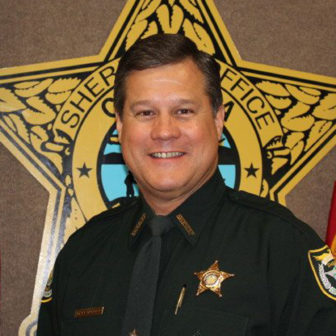
Columbia County Sheriff's Office
Mark Hunter
In Columbia County, just west of Jacksonville, Sheriff Mark Hunter, who also serves as president of the Florida Sheriffs Association, said, “I am open-minded, trying to help people,” but that he too was wary of reforms that could have unintended consequences.
Take for instance the move to arm teachers in Florida schools. “I’d want a law enforcement officer or military person with a warrior mentality,” he said. How would a teacher react if one of his or her students opened fire? “Teachers, they know the child, and they [might] have to decide whether to take that child out. It’s a mental struggle. Whereas with law enforcement, we train how to deal with aggressive behavior and use deadly force.”
Now that medical marijuana has been legalized, Hunter expects recreational marijuana won’t be far behind. Looking at states that have legalized recreational pot, he said, “If they’ll be honest about it, the experimental age has dropped, into elementary schools. That could present a whole new slate of problems.
Judd said of DeSantis, “I truly believe he’s got the best interests of Florida as his agenda, and I believe all of us just want people to behave and be orderly in society. We don’t want to put anyone in prison or incarcerated. Just those who need to be incarcerated, who would otherwise be out terrorizing the community.”
Whatever comes, Hunter said, “I’ll enforce the laws on the books. We’ll adjust.”
This project was collaboratively produced with Jaxlookout and underwritten in part by The Vital Projects Fund and NewsMatch funders like you.
